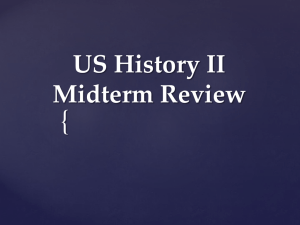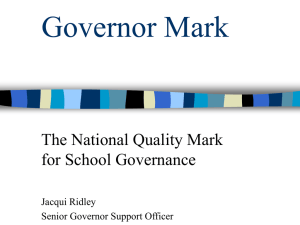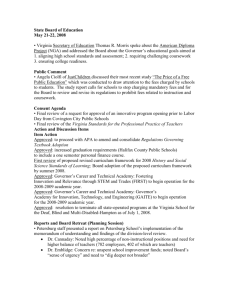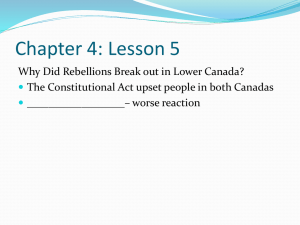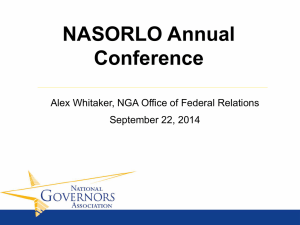Who can be Governor of NJ? - New Jersey Center for Civic Education
advertisement
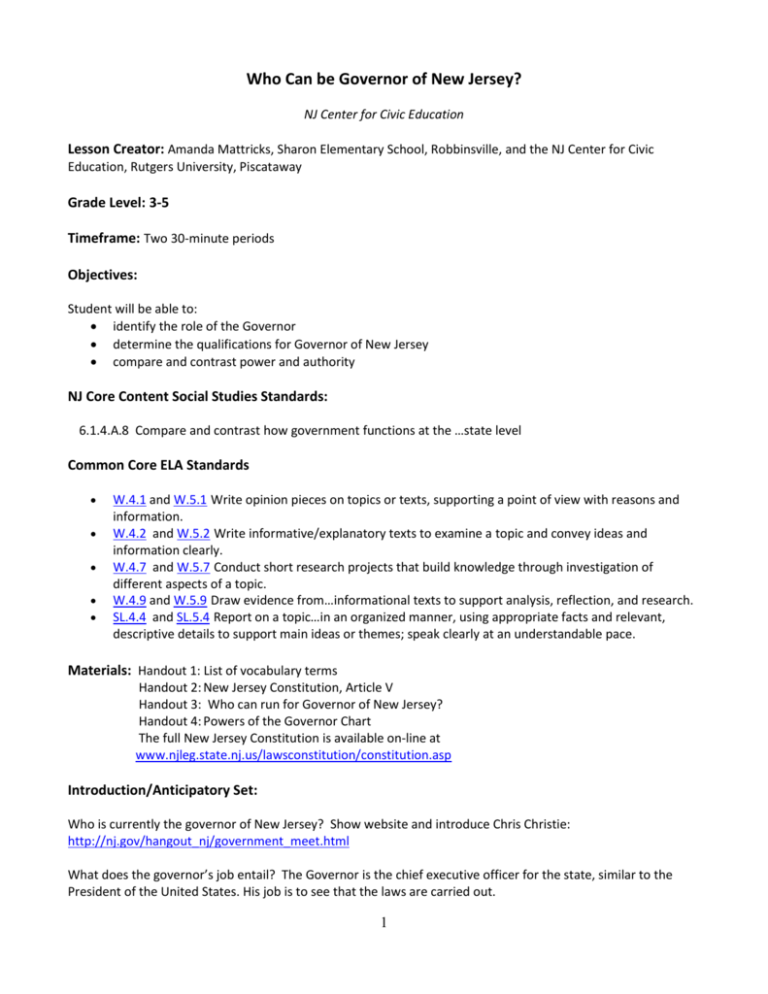
Who Can be Governor of New Jersey? NJ Center for Civic Education Lesson Creator: Amanda Mattricks, Sharon Elementary School, Robbinsville, and the NJ Center for Civic Education, Rutgers University, Piscataway Grade Level: 3-5 Timeframe: Two 30-minute periods Objectives: Student will be able to: identify the role of the Governor determine the qualifications for Governor of New Jersey compare and contrast power and authority NJ Core Content Social Studies Standards: 6.1.4.A.8 Compare and contrast how government functions at the …state level Common Core ELA Standards W.4.1 and W.5.1 Write opinion pieces on topics or texts, supporting a point of view with reasons and information. W.4.2 and W.5.2 Write informative/explanatory texts to examine a topic and convey ideas and information clearly. W.4.7 and W.5.7 Conduct short research projects that build knowledge through investigation of different aspects of a topic. W.4.9 and W.5.9 Draw evidence from…informational texts to support analysis, reflection, and research. SL.4.4 and SL.5.4 Report on a topic…in an organized manner, using appropriate facts and relevant, descriptive details to support main ideas or themes; speak clearly at an understandable pace. Materials: Handout 1: List of vocabulary terms Handout 2: New Jersey Constitution, Article V Handout 3: Who can run for Governor of New Jersey? Handout 4: Powers of the Governor Chart The full New Jersey Constitution is available on-line at www.njleg.state.nj.us/lawsconstitution/constitution.asp Introduction/Anticipatory Set: Who is currently the governor of New Jersey? Show website and introduce Chris Christie: http://nj.gov/hangout_nj/government_meet.html What does the governor’s job entail? The Governor is the chief executive officer for the state, similar to the President of the United States. His job is to see that the laws are carried out. 1 Vocabulary Let’s look at some vocabulary words that we will need to know: Authority Power Governor Legislature Eligible Term Resident Veto Advice and Consent Appropriation Use Handout I to review the meaning of the vocabulary words listed above. Activity One: Who Can Run for Governor? Can anyone serve as Governor of New Jersey? What does the NJ Constitution require? Handout 2 includes relevant provisions from the New Jersey State Constitution regarding who is eligible to run for the office of Governor of the State. The Governor must be at least thirty years old, a citizen of the United States for at least 20 years and a resident of New Jersey for at least seven years. Handout 3 has four possible candidates for Governor of New Jersey. Which of these individuals is eligible to run for Governor? Consider the relevant provisions of the New Jersey State Constitution in Handout 2 to determine which of the individuals described in Handout 3 (Jessica Simpson, Eddie Murphy, former Governor Thomas Kean and current U.S. Senator from New Jersey Robert Menendez) would be eligible to run for Governor of New Jersey. 1. The New Jersey Constitution requires that the Governor meet certain requirements to hold office. Can Jessica Simpson run for Governor of New Jersey? No, she is not 30 years old and she has not been a resident of the state for the past seven years. 2. Can Eddie Murphy run for Governor of New Jersey? Perhaps. He is over 30 years old and has been living in New Jersey since 1995 (However, since his divorce he may be moving out of state.) 3. Can former Governor Thomas Kean run for Governor of New Jersey again in 2008? Yes, he is over 30 years old and has resided in New Jersey for the past seven years. According to the New Jersey Constitution, Article V, Section I, Paragraph 5, he may run again four years after the end of his second successive term. He may run again since it has been more than four years since he left office in 1990. 4. Can U.S. Senator Robert Menendez run for Governor of New Jersey? He is over 30 years old, but mostly lives in Washington, D.C. However, the New Jersey Constitution, Article V, Section I, Paragraph 2 allows someone to be “absent during that time on the public business of the United States or of this State.” He qualifies for this exception as U.S. Senator. But, Paragraph 3 makes it clear that no member of Congress can also serve as Governor. Senator Menendez would have to vacate his U.S. Senate seat in order to run for 2 Governor. This was done by U.S. Senator Jon Corzine, who then ran for Governor of New Jersey in November 2005, and won. Alternative Online Quiz using Kahoots. Go to http://goo.gl/yf88N3 for the link to the game. All students can play the game at the same time for points and see who wins. Closure for activity one: Why do you think that it is necessary for someone to meet age, residency and other requirements in order to serve as Governor of the State? Do you think that it is a good idea to have age requirements for the Governor and other elected positions of authority? Why or why not? Do you think that it is important that the governor be a resident of the state he or she serves? Why or why not? Do you think that there should be additional qualifications or fewer qualifications? What would you add or subtract? Activity Two: Where does the Governor Get His Power? What is the difference between power and authority? Power is the ability to make someone do or not do something. Authority is the power along with the right to use power to influence or control the behavior of others. When a neighborhood bully forces a child to leave the playground, he has the power to do so. He does not have the right to do this. When a parent requires his or her child to go to bed, the parent has the power and the right to tell his or her children to do certain things. The Governor has the authority to exercise power for the benefit of the citizens of New Jersey. The Governor’s authority is both granted in the State Constitution. What are some sources of authority? How do people and institutions get authority? How do they acquire the right to tell other people what to do? Sources of authority come from four main sources: Custom: Custom is a long established practice of way of doing things. People in a group accept this method of doing something. Example: When your mother or father tells you to help with the chores, their authority comes from custom. People have long agreed that parents have the authority to assign chores to their children. Rules and laws: Some authority comes from rules and laws. Rules and laws tell some people, such as government officials, what they can and what they cannot do. 3 Example: The law gives teachers and principles the right to keep a safe and orderly school. The law, therefore, gives teachers the authority to tell students to stop talking while taking a test. Morality: A person’s sense of morality is his or her belief about right and wrong. A person’s sense of morality often influences or controls how he behaves in situations. A person may feel guilty if they act against their sense of morality. Example: Sally decides that she will not tease Billy because it could hurt his feelings. Consent: Some authority arises when people choose others to have authority over them. They agree, or consent, to give that person the right to tell them what to do in certain situations. Example: Marika’s classroom elected her the team leader for a game. The children agreed to give Marika the right to tell them what to do during the game. After the game was over, Marika no longer had this authority. Example: The people of New Jersey elect the Governor every four years. The citizens of the United States elect a President every four years. When their terms are completed, the President and Governor no longer have the authority they had while in office. As the head of the New Jersey government, the Governor has the authority to carry out the laws in New Jersey. The main source for the governor’s authority is the New Jersey State Constitution. Specifically, Article V of the New Jersey Constitution lists the powers of the Governor. Complete the chart on Handout 4. Answer the five questions on Handout 4 by explaining the powers that the Governor holds from the specific grants of authority in the New Jersey Constitution. A completed chart is below. The Governor’s Powers and the Sources of his Authority EXPLANATION OF POWERS 1. What power does the Governor have over the state military? SOURCES OF GOVERNOR’S AUTHORITY NJ Constitution, Article V, Section 1, Paragraph 12 2. What power/s does the Governor have regarding legislation? NJ Constitution, Article V, Section 1, Paragraph 12 The Governor may propose legislation in his annual speech to the Legislature at the opening of every session on the condition of the state. NJ Constitution, Article V, Section I, Paragraph 14 The Governor has the power to sign and approve a law or veto a law. Note: the legislature can override the Governor’s veto with 2/3 of all the members of each house. NJ Constitution, Article V, Section I, Paragraph 15 If a bill contains one or more items about the appropriation of money, the Governor may object in whole or in part to any such item or items while approving the other portions of the bill. This is called a “line-item veto.” It gives the Governor broad power to veto certain items within a bill. Even though this was 3. What power does the Governor possess over the budget process? According to this provision, the Governor is the Commander-in-Chief of all of the military and naval forces in the State. 4 declared unconstitutional within the federal purview, it is constitutionally permitted within New Jersey. 4. What power does the Governor have in regarding state law enforcement? 5. What positions does the Governor have the authority to appoint? NJ Constitution, Article V, Section II, Paragraphs 1 and 2 The Governor may grant pardons (release a person from punishment) and reprieves (reduce the sentence of a person) in all cases other than impeachment and treason. In addition, he may suspend fines and forfeitures. NJ Constitution, Article VII, Section II, Paragraph 1 In addition, the Governor appoints the county prosecutors, who are the chief law county enforcement officers. NJ Constitution, Article VI, Section VI, Paragraph 1 Judges NJ Constitution, Article V, Section IV, Paragraphs 2, 3 and 4. Cabinet members, including the Attorney General (Both judges and the State Attorney Generals are elected in the majority of states.) Closure for activity two: Have students share their answers from Handout 4. Conclude the lesson by noting that the New Jersey Governor, because of his broad appointment authority and veto power, is one of the most powerful governors in the country. Assessment: Students will be assessed throughout this exercise by their class and group participation skills. Students will write a short paragraph explaining what the Governor of New Jersey is authorized to exercise and the sources of this authority. 5 Handout 1 VOCABULARY Governor Elected person who heads the executive branch of state government; the Chief Executive of the state Legislature A body of elected members who have the authority to make laws for the state; New Jersey has a bicameral (two house) legislature made up of the General Assembly and the Senate Eligible Qualifies to be chosen, meets the requirements to run for an elected position Term Length of time a person serves in an elected position Resident Person who lives in a particular town or state Veto To refuse to approve a legislative bill (a power of the governor) Advice and Consent Recommendation given regarding a decision or course of action; refers to the NJ Senate’s ability to check the governor’s power by having to approve the governor’s appointments to many executive-branch jobs Power The ability to make someone do or not do something Authority The right to use power to influence or control the behavior of others Appropriation Legislative act that gives the authority to spend a designated amount of public funds for a specific purpose 6 Handout 2 NEW JERSEY STATE CONSTITUTION Article V, Section I 1. The executive power shall be vested in a Governor. 2. The Governor shall be not less than thirty years of age, and shall have been for at least twenty years a citizen of the United States, and a resident of this State seven years next before his election, unless he shall have been absent during that time on the public business of the United States or of this State. 3. No member of Congress or person holding any office or position of profit, under this State or the United States, shall be Governor. If the Governor or person administering the office of Governor shall accept any other office or position, of profit, under this State or the United States, his office of Governor shall thereby be vacated. No Governor shall be elected by the Legislature to any office during the term for which he shall have been elected Governor. 4. The Governor shall be elected by the legally qualified voters of this States. The person receiving the greatest number of votes shall be the Governor… 5. The term of office of the Governor shall be four years, beginning at noon of the third Tuesday in January next following his election, and ending at noon of the third Tuesday in January four years thereafter. No person who has been elected Governor for two successive terms, including an unexpired term, shall again be eligible for that office until the third Tuesday in January of the fourth year following the expiration of his second term. 7 Handout 3 WHO CAN RUN FOR GOVERNOR OF NEW JERSEY? Assignment: Consider the provisions of Section V of the New Jersey Constitution to determine whether any of the following individuals could serve as Governor in the state of New Jersey. Be prepared to explain why or why not. Name: Jessica Simpson Date and place of birth: July 10, 1980/ Abilene, Texas Current Residence: Los Angeles, California (since 1997) Ever held the position of New Jersey Governor? No Current Occupation: Actress/ Musician Name: Eddie Murphy Date and place of birth: April 3, 1961/ Brooklyn, New York Current Residence: Englewood, New Jersey (since 1995) Ever held the position of New Jersey Governor? No Current Occupation: Actor 8 Name: Thomas H. Kean Date and place of birth: April 21, 1935/ New York City, New York Current Residence: Bedminster Township, New Jersey (since 1990) Ever held the position of New Jersey Governor? Yes (1982–1990) Current Occupation: Lecturer/ Journalist Name: U.S. Senator Robert Menendez Date and place of birth: January 1, 1954/New York City Current Residence: North Bergen, New Jersey Ever held the position of New Jersey Governor? No Current occupation: U.S. Senator from New Jersey 9 Handout 4 Powers of the Governor As the head of the New Jersey government, the Governor holds numerous powers listed in Article V of the New Jersey Constitution. Many of these powers mirror those held by the President on the national level. Using Article V of the New Jersey Constitution, complete the chart below by explaining the powers that the Governor holds. 1. What power does the Governor have over the state military? 2. What power/s does the Governor have regarding legislation? 3. What power does the Governor possess over the budget process? 4. What power does the Governor have in regarding state law enforcement? SOURCES OF GOVERNOR’S AUTHORITY NJ Constitution, Article V, Section 1, Paragraph 12 EXPLANATION OF POWERS NJ Constitution, Article V, Section 1, Paragraph 12 NJ Constitution, Article V, Section I, Paragraph 14 NJ Constitution, Article V, Section I, Paragraph 15 NJ Constitution, Article V, Section II, Paragraphs 1 and 2 . NJ Constitution, Article VII, Section II, Paragraph 1 5. What positions does the Governor have the authority to appoint? NJ Constitution, Article VI, Section VI, Paragraph 1 NJ Constitution, Article V, Section IV, Paragraphs 2, 3 and 4 NJ Constitution, Article V, Section III, Paragraph 2 10

